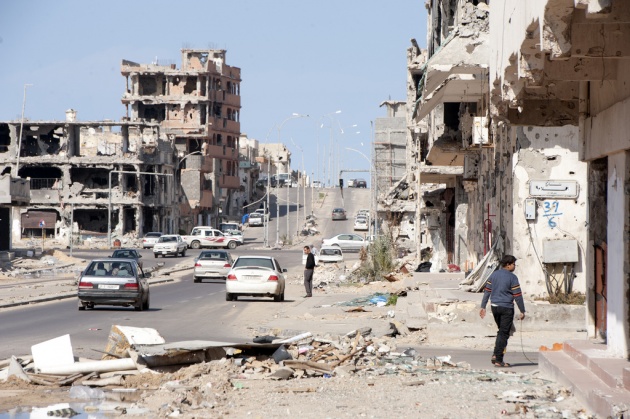
Dec 4, 2019
Today, the ICJ joined seven other non-governmental organizations calling on States to establish a Commission of Inquiry or similar mechanism for Libya at the 43rd session of the UN Human Rights Council from February to March 2020.
The mechanism should document human rights violations and abuses, identify those responsible for them, preserve evidence for use in future criminal proceedings, and publicly report on the human rights situation in the country.
“Impunity reigns in Libya and, without an overhaul of the criminal justice system, future investigations or prosecutions are unlikely to be effective,” said Said Benarbia, the ICJ’s MENA Programme Director.
“As negotiations for a ceasefire and political solution to the conflict in Libya continue, States cannot keep on ignoring accountability for the egregious human rights violations and abuses committed in the country,” he added.
In July this year, the ICJ released a report – Accountability for Serious Crimes Under International Law in Libya: An Assessment of the Criminal Justice System – which found that the legal framework in Libya does not meet international standards governing the rights to liberty and to a fair trial of detained or accused persons, or the rights of victims to a remedy and reparation.
Crimes against humanity and war crimes, committed by State and non-State actors on a widespread scale in Libya, are not penalized under domestic law at all. The definitions of crimes such as torture, enforced disappearances, extrajudicial killings and rape are also inconsistent with those under international law.
“While the International Criminal Court has jurisdiction over crimes against humanity and war crimes committed in Libya since 2011, it is not a panacea for all crimes perpetrated in the country, nor can it contribute to the development of viable institutional and legislative reforms needed for human rights and the rule of law to take root,” said Kate Vigneswaran, the ICJ’s MENA Programme Senior Legal Adviser.
At the 42nd Session of the Human Rights Council, Kate Gilmore, UN Deputy High Commissioner for Human Rights, and Ghassan Salame, Special Representative of the UN Secretary-General (SRSG) and Head of the UN Support Mission in Libya (UNSMIL), called for the establishment of an international body to investigate violations of international human rights and humanitarian law in Libya.
“States have been relegating accountability in Libya, purportedly in the interests of peace, for far too long, an approach that has continually proven to yield little in the way of a political solution or the cessation of human rights violations and abuses against the many thousands of victims. States should take heed of the SRSG and Deputy High Commissioner’s statements,” said Vigneswaran.
Other signatories to the joint letter are Amnesty International, the Cairo Institute for Human Rights Studies, the International Federation for Human Rights, Human Rights Watch, Lawyers for Justice in Libya, the Libya Platform, and the Women’s International League for Peace and Freedom.
Contact:
Said Benarbia, Director of the ICJ Middle East and North Africa Programme, t: +41-22-979-3817; e: said.benarbia(a)icj.org
Kate Vigneswaran, ICJ Senior Legal Adviser, t: +31624894664, e: kate.vigneswaran@icj.org, twitter: @KateVigneswaran
Libya-Letter to HRC-Advocacy-open letters-2019-ENG (open letter in English, PDF)
Libya-Open letter HRC_News-press release-2019-ARA (press release in Arabic, pdf)
Libya-Letter to HRC-Advocacy-open letters-2019-ARA (open letter in Arabic, PDF)
Photo credit: Image by European Commission DG ECHO
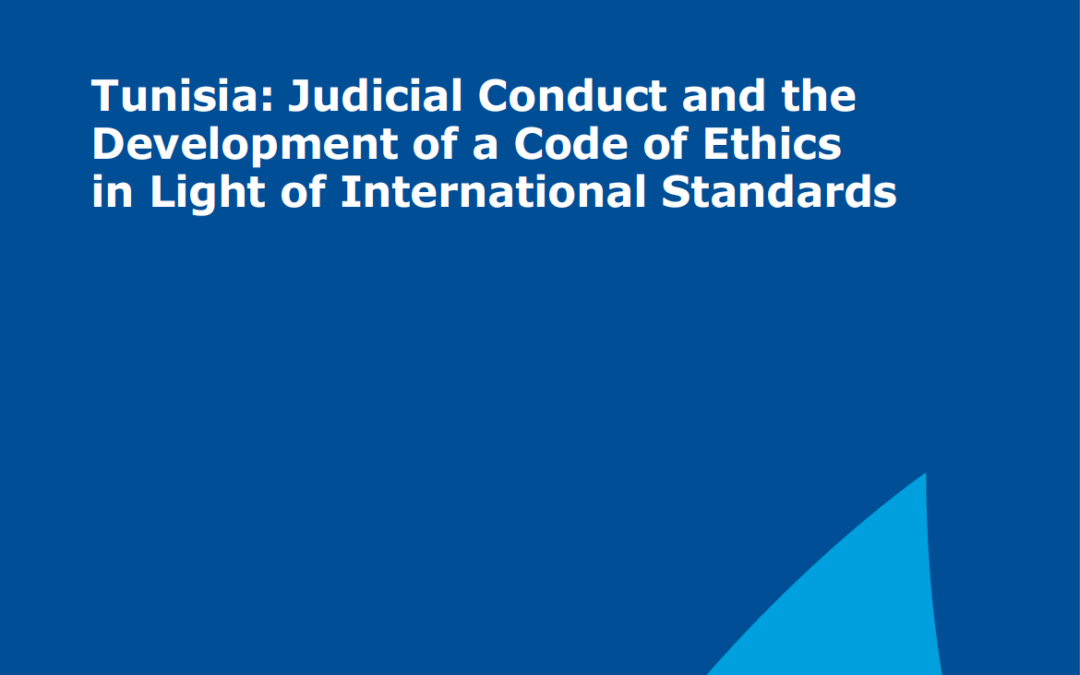
Nov 27, 2019
Tunisian authorities must ensure that the process of developing and adopting a Judicial Code of Ethics and Judicial Conduct in the country is inclusive and transparent, said the ICJ in a briefing paper released today in Tunis.
The Code must also align with international standards and be effectively and independently implemented to secure judicial independence and accountability, the memo Tunisia: Judicial Conduct and the Development of a Code of Ethics in Light of International Standards (available in English and Arabic), adds.
In the paper, the ICJ recommends the adoption of a clear, transparent and inclusive procedure for developing and adopting the Judicial Code, and for its content to conform to the UN-endorsed Bangalore Principles of Judicial Conduct.
“Adopting a Code of Ethics and Judicial Conduct is a unique opportunity for Tunisian authorities to bolster judicial independence and restore public confidence in judicial institutions,” said Saïd Benarbia, Director of the Middle East and North Africa Programme at the ICJ.
“The authorities should get both the process and the content right, and ensure that such a code provides detailed guidance to judges on what kind of conduct is expected of them,” he added.
The adoption of a Code of Ethics has the potential to remedy the shortcomings of the current legal framework on judicial independence and accountability.
Organic Law No. 67-29 on the Judiciary, the High Judicial Council and the Statute for Judges, even as modified by Organic Law No. 2013-13, does not adequately or sufficiently provide for the guarantees to uphold judicial individual independence, the criteria and procedures for recusal or disqualification, or the need to avoid use of one’s office for private gain.
This is particularly problematic given that the current disciplinary procedures are inconsistent with international standards and best practices for judicial independence and impartiality, including because of the role of the Minister of Justice in initiating such procedures.
Against this background, the ICJ calls on the Tunisian authorities to:
- Ensure that the Judicial Code is established in law as the basis on which judges will be held to account professionally;
- Ensure that the principles of independence, impartiality, integrity, propriety, equality, competence and diligence are clearly incorporated in the Judicial Code of Ethics in accordance with the Bangalore Principles and other relevant international standards;
- Amend Organic Law No. 67-29 to ensure that judges in Tunisia enjoy personal immunity from civil suits for monetary damages for improper acts or omissions in the exercise of their judicial functions; instead, in appropriate cases, persons who suffer losses as a result of such improper acts or omissions should be able to make a claim for compensation against the State itself;
- Ensure that the law and the Judicial Code clearly and precisely define the forms of misconduct that may lead to a judge’s discipline;
- Provide, in a manner consistent with independence of the judiciary, for individual judges to be held responsible, through disciplinary or criminal proceedings or both as appropriate, for perpetration of or complicity in violations of human rights, international humanitarian law and for judicial corruption; in this regard clearly prescribe the offences that could give rise to disciplinary liability for such acts or omissions, in line with international law and standards; and
- Ensure, in defining grounds for disciplinary action, that the fundamental rights and freedoms of judges are upheld and respected.
Contact
Saïd Benarbia, Director of the ICJ Middle East and North Africa Programme, t: +41.22.979.3817, e: said.benarbia(a)icj.org
Additional information
ICJ Commissioner Martine Comte led the delegation that met with different Tunisian authorities and justice actors this week in Tunis in order to present ICJ’s memo and discuss its findings and recommendations. The ICJ delegation met with Mr. Youssef Bouzeker, President of the Tunisian High Judicial Council, and other senior officials of the Tunisian Ministry of Justice and of the Tunisia Bar Association.
Tunisia-Code of Ethics-Advocacy-Analysis Brief-2016-ENG (full paper, in PDF)
Tunisia-judicial code-news-press release-2019-ARA (full story, Arabic version, in PDF)
Tunisia-Code of Ethics-Advocacy-Analysis Brief-2016-ARA (full paper, Arabic version, in PDF)
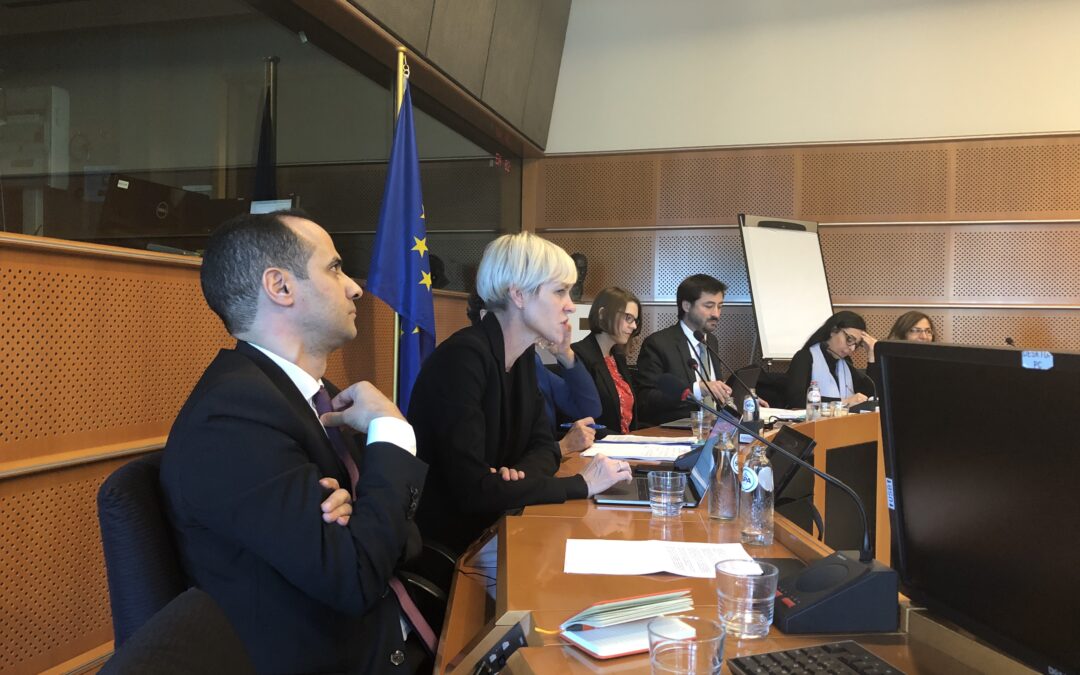
Nov 22, 2019 | News
On 20 November 2019, the ICJ and Tineke Strik, Member of the European Parliament, hosted a roundtable discussion in Brussels on the ICJ’s report Accountability for Crimes under International Law in Libya: An Assessment of the Criminal Justice System.
Panelists called for the establishment of a Human Rights Council mandated Commission of Inquiry on Libya and for States to refrain from entering or implementing agreements that could give rise to support for or complicity in violations of international law.
They also called for the intensification of monitoring of Libyan Coast Guard operations and publication of its key findings, and for the European Commission to ensure its cooperation with Libyan authorities is conditional on meeting concrete, verifiable and timebound benchmarks.
At the launch, Said Benarbia and Kate Vigneswaran, MENA Programme Director and Senior Legal Adviser respectively, discussed the findings and recommendations of the ICJ’s report examining the criminal justice framework in Libya. The report finds that investigations and prosecutions of crimes under international law have been limited to a handful of cases, and substantial reforms to the legal framework are required to ensure fair and effective justice in future cases.
In light of the report’s findings, Marwa Mohammed, Head of Advocacy and Outreach for Lawyers for Justice in Libya, discussed the arbitrary detention of thousands of migrants, refugees and asylum seekers in Libya, systematic human rights violations and abuses being committed against them, and absence of options for protection, repatriation and return, including as a result of EU States’ policies.
Philippe Dam, Advocacy Director for Europe and Central Asia at Human Rights Watch, then discussed the engagement of the EU, European Commission and EU States with Libyan authorities, including in the context of violations and abuses committed against migrants, refugees and asylum seekers intercepted by the Libyan Coast Guard.
The panel was introduced by Karolina Babicka, Legal Advisor for the ICJ’s Europe and Central Asia Programme, and moderated by Tinneke Strik. It was attended by representatives of the European Commission, the EEAS, UNHCR, non-government organizations and independent persons
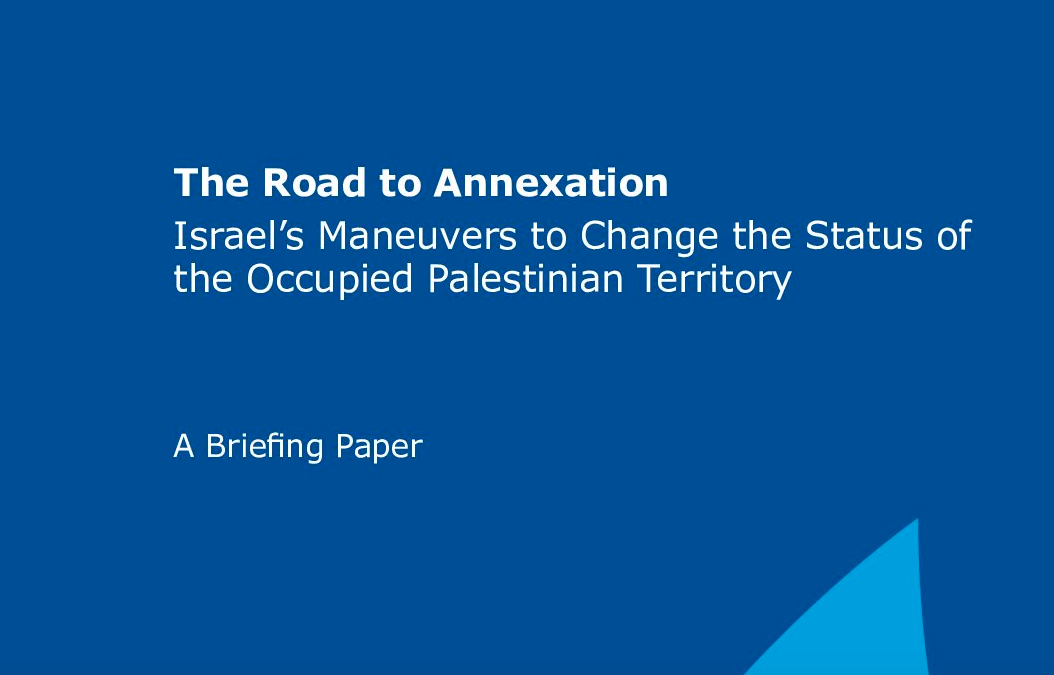
Nov 20, 2019
Israel must comply with its obligations under international law and reverse its policies and practices aiming at formally annexing parts of the West Bank, the ICJ said in a Briefing Paper released today, analyzing the applicable international law.
The ICJ’s analysis – The Road to Annexation – contradicts the 18 November 2019 statement by the US Secretary of State, Michael R. Pompeo, in which he asserted that the establishment of Israeli civilian settlements in the West Bank is “not per se inconsistent with international law.”
“Israel’s settlements are illegal no matter how hard the Israeli and the US governments try to spin or whitewash them,” said Said Benarbia, the ICJ Middle East and North Africa Director.
“Any sovereignty claims by Israel over East Jerusalem and the West Bank are null and void under international law and must be repudiated, not condoned or encouraged,” he added.
The ICJ’s Briefing Paper explains that such statements by the US administration are void and of no effect under international law, as are the underpinning Israeli settlement laws, policies and practices.
Throughout the 52 years of occupation over the West Bank, including East Jerusalem, Israel has implemented long-term, irreversible changes to the occupied territory, including the establishment and continuous expansion of Israeli settlements, as well as the construction of the Separation Barrier incorporating considerable parts of the West Bank into Israeli territory.
The ICJ Briefing Paper finds that these activities, combined with Israel’s legislative activity aiming at extending its sovereignty over settlements, are a further, strong evidence of Israel’s plans to annex parts of the West Bank.
Such annexation is prohibited by international law, including Article 2(4) of the UN Charter, which forbids the use of force against the territorial integrity of a State and, consequently, the transmission of sovereign title over territories resulting from such use of force.
The International Court of Justice has affirmed that the prohibition of territorial acquisition by force is a peremptory norm of international law, from which no derogation is permitted.
The ICJ also examines the legal implications of the annexation of the West Bank for third States, urging them not to recognize annexation efforts and activities, refrain from providing assistance to them, and act, collectively and individually, to bring such unlawful conduct to an end.
“The international community must not legitimize or aid and abet Israel’s moves to annex parts of the West Bank,” said Said Benarbia.
“Instead of condoning and supporting the acquisition of land by force, the US should urge Israel to end its occupation of the Palestinian territory, including by dismantling existing settlements and refraining from establishing new ones,” he added.
Contact:
Said Benarbia, Director of ICJ’s Middle East and North Africa Program, t: +41 22 979 38 17 ; e: said.benarbia(a)icj.org
Download:
Israel-Road to Annexation-Advocacy-Analysis brief-2019-ENG
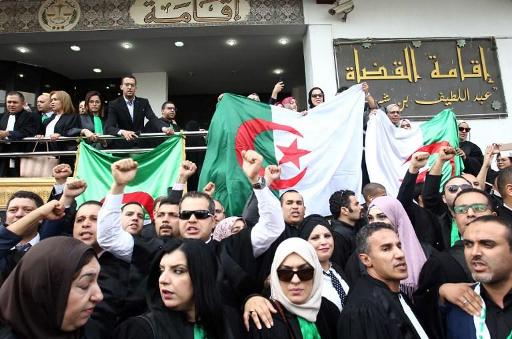
Nov 6, 2019 | News
The ICJ today called on the Algerian authorities to reverse the decision of the Minister of Justice to transfer 2’998 judges, and instead ensure their right to security of tenure and protect the individual and institutional independence of the judiciary in the country.
The ICJ further called on the authorities to refrain from any unlawful or disproportionate use of force against the judges who are currently on strike in a protest against the Minister’s decision.
The call comes after security forces stormed the Oran’s Court of Appeal on 3 November 2019, using force against the judges to end the strike, and amidst the growing, legitimate demands for the establishment of the rule of law and the end the executive’s control over the judiciary.
“The Algerian authorities must end their interference in judicial affairs and ensure that all decisions pertaining to the management of the career of judges, including transfers, are taken by an independent High Judicial Council on the basis of objective criteria and transparent procedures,” said Said Benarbia, Director of ICJ’s Middle East and North Africa Programme.
Under Organic Law n° 04-12 on the High Judicial Council (HJC), the President and Vice-President of the HJC are respectively the Algerian President and the Minister of Justice. For this and other reasons the ICJ considers that the HJC as currently constituted is not independent of the executive, and consequently that the judiciary as a whole is both institutionally and in practice subordinated to the executive in contravention of international standards on judicial independence and impartiality.
“Instead of attacking judges who are seeking to defend the rule of law, the most urgent priority for Algerian authorities should be the reform of the HJC to ensure its full independence,” Benarbia added.
In 2018, the Human Rights Committee expressed, in its Concluding Observations on the fourth periodic report of Algeria, its concerns over the insufficient guarantees for judicial independence and the need to strengthen the independence and the powers of the HJC.
Contact:
Said Benarbia, Director of ICJ’s Middle East and North Africa Program, t: +41 22 979 38 17 ; e: said.benarbia(a)icj.org
Algeria-Judges strike-News-2019-ARA (Arabic version, in PDF)









